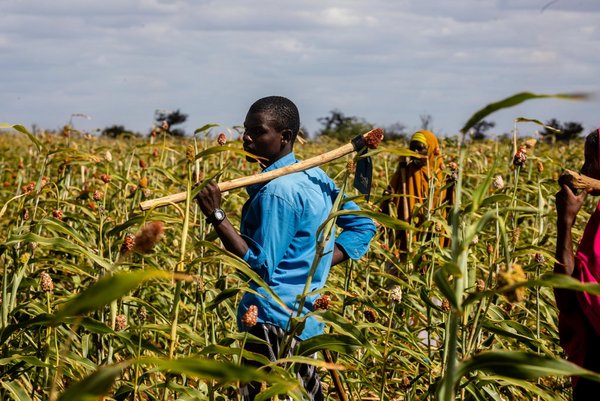 Read this article in French
Read this article in French- Share this article
- Subscribe to our newsletter
New initiatives to benefit millions of people
The Global Environment Facility (GEF) has green-lighted 48 FAO-led projects worth about USD 2.9 billion – USD 294 million in project financing and USD 2.6 billion in co-financing – that will play a pivotal role in fostering a sustainable agrifood systems transformation to end hunger and conserve the environment, the Food and Agriculture Organization of the United Nations (FAO) announced in February 2024.
The initiatives, benefitting 4.2 million people in five different regions globally, will restore more than 474,000 hectares of land, improve practices on over 24 million hectares of land and marine habitats, create and improve the management of over 2 million hectares of protected areas on land and sea, mitigate 133 million metric tons of greenhouse gas emissions and remove 202 metric tons of hazardous agrochemicals. Forty-six countries partnered with FAO to access finance from the GEF in this work programme.
Alongside others, two large programmes to be rolled out are the Food Systems Integrated Program and the Clean and Healthy Ocean Integrated Program.
The Food Systems Integrated Program
The Food Systems Integrated Program (FSIP), co-led with the International Fund for Agricultural Development (IFAD), will direct USD 252 million in project financing and USD 2.2 billion in co-financing to 32 countries. The FSIP focuses on transforming global agrifood systems from farm to table so that they are sustainable, nature positive, resilient, inclusive and pollution-free. The programme will deliver global benefits for biodiversity, addressing land degradation and climate change, along with improved food security, nutrition, incomes, livelihood sustainability and resilience.
FAO will implement projects in 22 countries to support National Food Systems Transformation Pathways or other government-led frameworks and meet environmental commitments, such as the Kunming-Montreal Global Biodiversity Framework and the Paris Agreement.
The programme focuses specifically on eight agrifood value chains and sectors: maize, rice, wheat, cocoa, palm oil, soy, livestock and aquaculture. The initiative is also expected to restore more than 870,000 hectares of degraded croplands, forests, natural grasslands and wetlands, as well as improve management practices of almost 14 million hectares of land. These measures will help mitigate more than 174 million metric tons of greenhouse gas emissions and eliminate 220 metric tons of highly hazardous pesticides.
Clean and Healthy Ocean Integrated Program
Meanwhile, the Clean and Healthy Ocean Integrated Program will direct USD 100 million in project financing to 14 countries, leveraging USD 748 million in co-financing, to reduce land-based ocean pollution in nine Large Marine Ecosystems (LMEs).
The programme addresses marine hypoxic zones – also known as “dead zones” – by curbing land-based sources of pollution from agriculture (overuse of fertiliser, livestock pollution) and industrial and municipal sources (untreated wastewater) through policy and regulatory measures and infrastructure investments combined with the sustainable management of natural resources and ecosystem-based solutions.
The initiative aims to create a conducive environment for advancing countries' sustainable blue economy goals, aligning with the Kunming-Montreal Global Biodiversity Framework (GBF) targets. Under the GBF, it targets inland and marine ecosystem restoration, pollution reduction, sustainable agriculture, disease reduction and sustainable urban areas. It will enhance the management of more than 520,000 hectares of land and 423,000 hectares of marine protected areas while restoring almost 97,000 hectares of various ecosystems.
The programme, which is expected to also sequester over nine million tons of greenhouse gas emissions, is co-led by FAO, the Asian Development Bank (ADB), the Development Bank of Latin America (CAF) and the European Bank for Reconstruction and Development (EBRD).
(FAO/ile)
Read more on the FAO website





Add a comment
Comments :